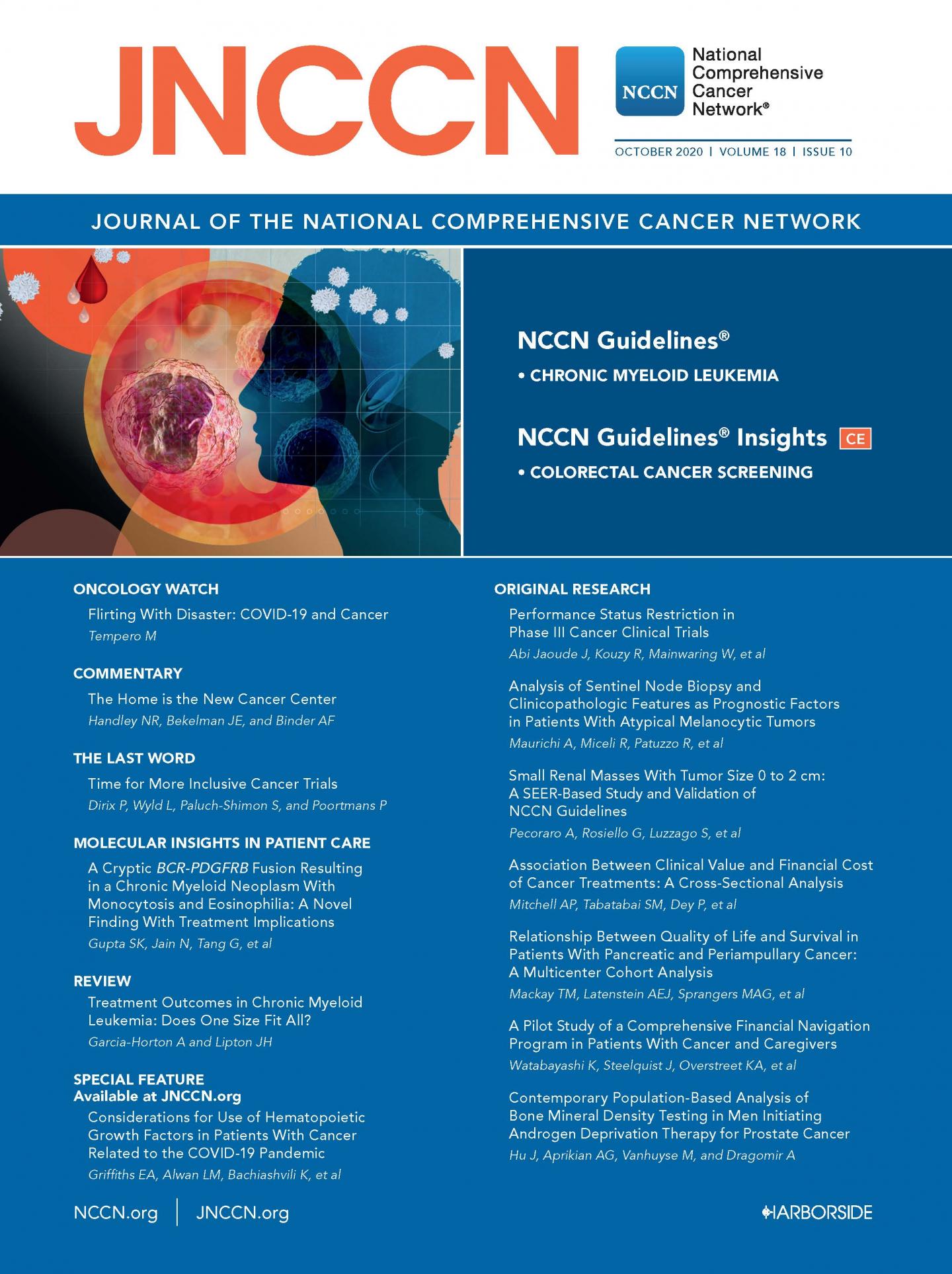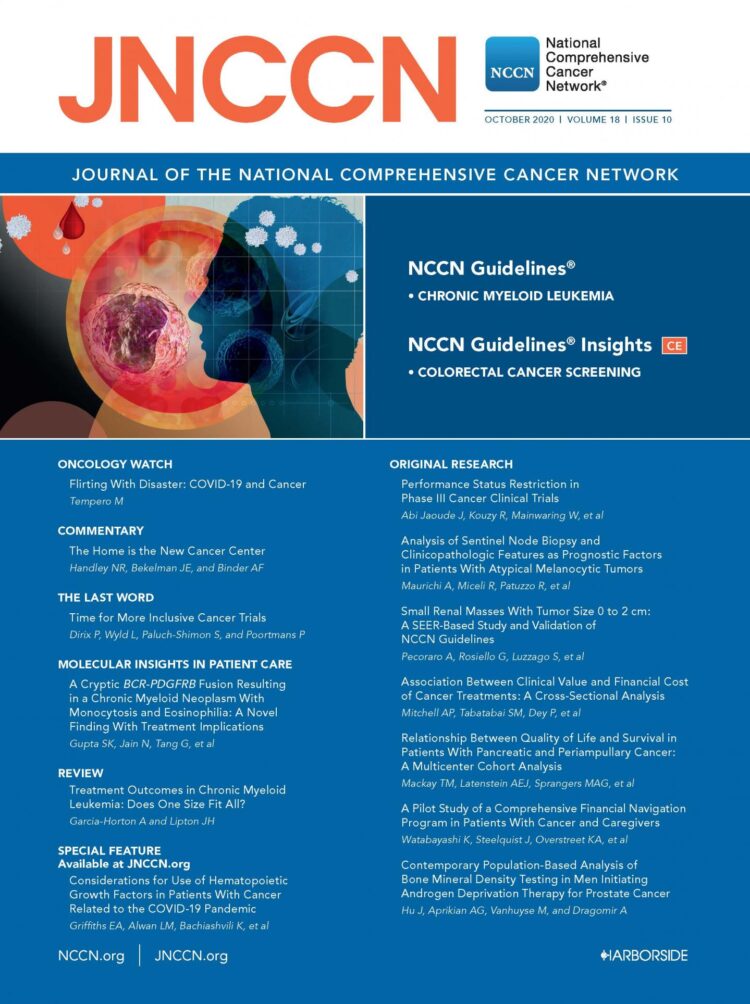Study out of Quebec finds bone mineral density testing for patients with prostate cancer undergoing ADT therapy are not meeting guideline recommendations

Credit: NCCN
PLYMOUTH MEETING, PA [October 7, 2020] — New research in the October 2020 issue of JNCCN–Journal of the National Comprehensive Cancer Network finds the rate of bone mineral density (BMD) testing in people with prostate cancer undergoing androgen deprivation therapy (ADT) has improved in recent years, but remains low. ADT is considered a cornerstone of treatment for high-risk or advanced prostate cancer and is used in nearly half of all prostate cancer patients. However, it can result in preventable side effects like osteoporosis and bone fractures. Despite clinical recommendations that call for BMD testing in ADT recipients, only 23.4% of the patients studied received testing in 2015. That is up from just 4.1% in 2000.
“Although we expected BMD testing rates to be fairly low given the prior literature, we were somewhat surprised that they didn’t go up more in recent years,” said senior author Alice Dragomir, MSc, PhD, McGill University in Montreal, Quebec who worked with Armen G. Aprikian, MD, Marie Vanhuyse, MD, MSc, and Jason Hu, MSc, also from McGill. “Bone density testing helps doctors evaluate fracture risk and identify which patients would benefit from additional monitoring and interventions like lifestyle changes and/or medications. Perhaps the low rate of testing will change in the coming years thanks to renewed attention on bone health issues in the clinical oncology community. It may be interesting to re-examine BMD testing rates in a few years.”
The researchers used the Régie de l’assurance maladie du Québec (RAMQ)–a Canadian public healthcare administrative database–to review patient demographic and billing information for 22,033 people with prostate cancer who began receiving ADT between January 2000 and December 2015. Of those, 3,910 (17.8%) received a BMD test at any point during the study period. The largest increase in testing rates occurred around 2003 and 2004, coinciding with the publication of several articles and guidelines recommending BMD screening in this set of patients. People age 80 and older, with metastatic disease, or living in rural areas were less likely to be screened.
“While we have known for many years that the androgen deprivation therapies used to treat prostate cancer carry an increased risk of osteoporosis, this study identifies specific populations that might not undergo recommended screening prior to hormone-based therapies,” commented Joshua M. Lang, MD MS, Associate Professor of Medicine, Carbone Cancer Center, University of Wisconsin. “These populations are especially vulnerable, including our older patients located in rural areas of the country.”
Dr. Lang, a Member NCCN Guidelines® Panel for Prostate Cancer, who was not involved in this research, continued: “The importance of screening is even more critical given the availability of medications that can slow or reverse osteoporosis. The NCCN Guidelines for Prostate Cancer specifically recommend screening for these patients and this report demonstrates that more work is needed to advocate for and implement screening of vulnerable patient populations.”
###
To read the entire study, visit JNCCN.org. Complimentary access to “Contemporary Population-Based Analysis of Bone Mineral Density Testing in Men Initiating Androgen Deprivation Therapy for Prostate Cancer” is available until January 10, 2021.
About JNCCN–Journal of the National Comprehensive Cancer Network
More than 25,000 oncologists and other cancer care professionals across the United States read JNCCN–Journal of the National Comprehensive Cancer Network. This peer-reviewed, indexed medical journal provides the latest information about innovation in translational medicine, and scientific studies related to oncology health services research, including quality care and value, bioethics, comparative and cost effectiveness, public policy, and interventional research on supportive care and survivorship. JNCCN features updates on the NCCN Clinical Practice Guidelines in Oncology (NCCN Guidelines®), review articles elaborating on guidelines recommendations, health services research, and case reports highlighting molecular insights in patient care. JNCCN is published by Harborside. Visit JNCCN.org. To inquire if you are eligible for a FREE subscription to JNCCN, visit http://www.
About the National Comprehensive Cancer Network
The National Comprehensive Cancer Network® (NCCN®) is a not-for-profit alliance of leading cancer centers devoted to patient care, research, and education. NCCN is dedicated to improving and facilitating quality, effective, efficient, and accessible cancer care so patients can live better lives. The NCCN Clinical Practice Guidelines in Oncology (NCCN Guidelines®) provide transparent, evidence-based, expert consensus recommendations for cancer treatment, prevention, and supportive services; they are the recognized standard for clinical direction and policy in cancer management and the most thorough and frequently-updated clinical practice guidelines available in any area of medicine. The NCCN Guidelines for Patients® provide expert cancer treatment information to inform and empower patients and caregivers, through support from the NCCN Foundation®. NCCN also advances continuing education, global initiatives, policy, and research collaboration and publication in oncology. Visit NCCN.org for more information and follow NCCN on Facebook @NCCNorg, Instagram @NCCNorg, and Twitter @NCCN.
Media Contact
Rachel Darwin
[email protected]
Original Source
https:/
Related Journal Article
http://dx.





